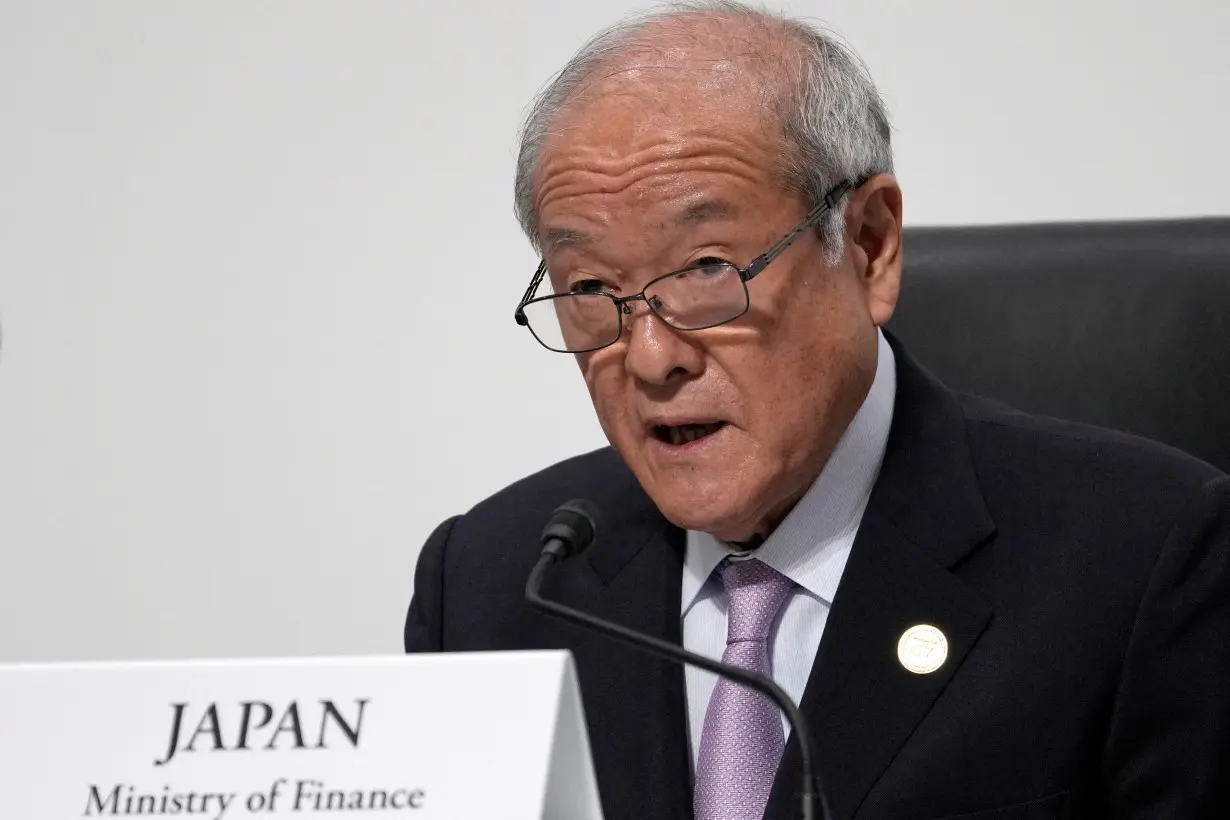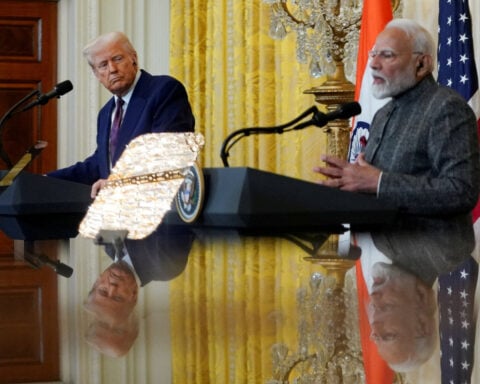By Satoshi Sugiyama and Makiko Yamazaki
TOKYO (Reuters) -Japan is concerned about negative effects of the weak yen, finance minister Shunichi Suzuki said on Friday, in a fresh warning to speculators as the currency fell further after the central bank's widely expected decision to hold rates steady.
The Bank of Japan kept policy settings unchanged earlier in the session following a two-day meeting, triggering a bout of volatility in the yen as it slid to below 156 levels on the dollar, its weakest since 1990.
The latest wobbles in the currency came as Suzuki, who spoke hours ahead of the BOJ decision, repeated his recent warnings against speculative moves in the yen, keeping traders on edge as to when Tokyo may intervene in the markets.
"The weak yen has both positive and negative impacts (on the economy)," Suzuki told a press conference, adding that he is "more concerned about the negative effects right now."
Suzuki said he could not comment on specific policy measures on foreign exchange, but that authorities were closely watching currency moves and stood ready to take action.
While a weak yen boosts exports, it has become a headache for Japanese policymakers as it inflates the cost of living for households by pushing up import prices. The finance minister said that measures to combat surging prices are key policy priorities for the government.
The yen's slide to 34-year lows against a broadly firmer dollar has been driven by wide U.S.-Japan interest rate differentials. The yield-induced downturn in the yen has gained renewed momentum on signs the Bank of Japan will go slow on raising its near-zero rates and expectations the U.S. Federal Reserve will likely delay the start of its rate-cutting cycle.
INTERVENTION IS 'FUTILE'
At a post-policy press conference, BOJ Governor Kazuo Ueda gave little away on when the next rate hike would come.
Ueda said while the impact of yen moves was usually temporary, its effects on underlying inflation could not be dismissed.
The yen briefly jumped against the dollar after Ueda's briefing ended, but it was not immediately clear whether authorities actually stepped in. The Japanese currency was last down around 0.7% at 156.69, after temporarily spiking to 154.97, having minutes earlier slumping to fresh 34-year lows of 156.82.
"The currency takeaway is certainly disappointment from the lack of guidance from the bank," said Rodrigo Catril, senior Sydney-based forex strategist at National Australia Bank.
"To me, the currency market is telling us it believes that the BOJ policy is too loose and hence why the currency is so weak."
The yen's continued weakness has taken it firmly past 152 and 155 levels to the dollar, which traders had previously seen as a line in the sand that would prompt Tokyo to intervene in the markets. It is down around 10% on the dollar this year and has lost more than 34% of its value in three years.
Suzuki declined to comment on remarks made by U.S. Treasury Secretary Janet Yellen that the U.S. dollar has been strong and interventions by other governments in currency markets is acceptable only in rare and extraordinary circumstances.
At the parliament later in the day, Suzuki said while foreign exchange levels reflect various factors including economic indicators and price trends, interest rate differentials remain the crucial determinant.
Japan last intervened in the currency market in 2022, spending roughly $60 billion to defend the yen.
Traders figure there is not much Tokyo can do to reverse the currency's slide while interest rates and momentum are heavily skewed against it.
"(Currency) intervention in a scenario where we're seeing upward pressure on U.S. Treasury yields is going to be a futile exercise," NAB's Catril said.
(Reporting by Satoshi Sugiyama, Makiko Yamazaki and Leika Kihara; Editing by Shri Navaratnam)

 Trump has begun another trade war. Here's a timeline of how we got here
Trump has begun another trade war. Here's a timeline of how we got here
 Canada's leader laments lost friendship with US in town that sheltered stranded Americans after 9/11
Canada's leader laments lost friendship with US in town that sheltered stranded Americans after 9/11
 Chinese EV giant BYD's fourth-quarter profit leaps 73%
Chinese EV giant BYD's fourth-quarter profit leaps 73%
 You're an American in another land? Prepare to talk about the why and how of Trump 2.0
You're an American in another land? Prepare to talk about the why and how of Trump 2.0
 Chalk talk: Star power, top teams and No. 5 seeds headline the women's March Madness Sweet 16
Chalk talk: Star power, top teams and No. 5 seeds headline the women's March Madness Sweet 16
 Purdue returns to Sweet 16 with 76-62 win over McNeese in March Madness
Purdue returns to Sweet 16 with 76-62 win over McNeese in March Madness








